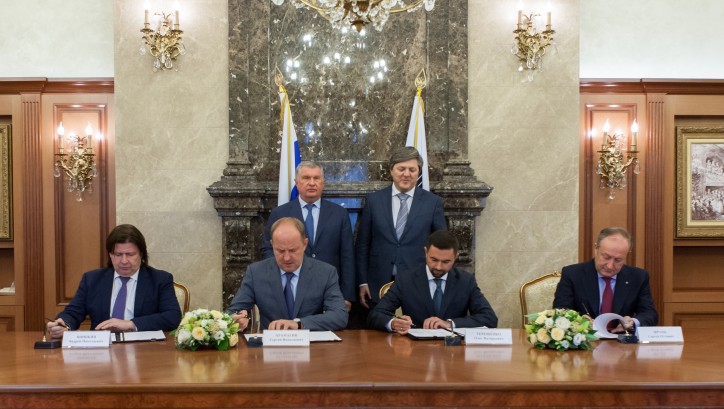PAO Sovcomflot (SCF Group), Rosneft, the State Transport Leasing Company (STLC), and Zvezda Shipbuilding Complex have signed a set of agreements that entail the construction of five Aframax tankers to enable export shipments of crude oil and oil products.
The 114,000 dwt vessels will be built by Zvezda jointly with Hyundai Heavy Industries (Republic of Korea), the world’s leader in Aframax construction and the technology partner of Zvezda.
The new vessels are due to enter service beginning from 2021. The tankers will have an ice class of 1A/1B, sufficient to ensure safe year-round operations in regions with challenging ice conditions, including the Baltic Sea and subarctic seas.

Sovcomflot (SCF) will operate all the tankers, first supervising their construction and then providing a range of services to ensure the effective and safe management of these vessels, including the recruitment of high-skilled crews and their management.
This series of tankers heralds a new generation of merchant vessels with higher environmental safety standards. They are purpose-designed to use LNG (liquefied natural gas) as their primary fuel, which significantly reduces their environmental impact. The vessels were designed to comply with most stringent international Sulphur Oxide (SOx), Nitrogen Oxide (NOx), and Carbon Dioxide (CO2) emission standards, governed by new IMO regulations that are scheduled to come into effect from 2020 and will apply, amongst other areas, to the Baltic and North Seas.
The technical specification of the new tankers was designed by SCF’s specialists, with the close involvement of the Far Eastern Shipbuilding and Ship Repair Centre (FESRC). When designing the tankers, SCF’s team applied the Group’s vast experience of operating large-capacity tankers under adverse climatic and ice conditions. (For reference: For more than 15 years SCF Aframax tankers have been successfully shipping crude oil in the Baltic Sea and subarctic seas).
Sergey Frank, President and CEO of Sovcomflot, said: “On the global market, Sovcomflot has a strong reputation as a world-class operator of large-capacity tankers, as well as platform supply vessels, and we remain the world’s No.1 operator of Aframax tankers, which comprise over one-third of the SCF fleet.
“Sovcomflot welcomes the further expansion of mutually beneficial cooperation with Rosneft, Russia’s largest oil exporter. SCF Group is already operating three Rosneft-owned ice-class 30,000 dwt tankers (RN Arkhangelsk, RN Murmansk, and RN Privodino), all of them transporting oil and petroleum products across the Baltic Sea and in the Arctic. SCF is also involved in crude oil transhipment operations for Rosneft.
“We welcome the commitment of Zvezda to a project that exceeds the highest technical requirements of the market. We hope that the beginning of serial production of cutting-edge large-capacity LNG-fueled tankers in Russia will facilitate the the further development of Russia’s port infrastructure that will allow ships to be bunkered with LNG fuel at Russian ports. We are also looking forward to seeing Russian regulators and maritime authorities continue with providing incentives for charterers, ship owners, and fleet operators who are taking real steps towards investing in green technologies.”
Igor Tonkovidov, Executive Vice-President and Technical Director of Sovcomflot, said: “For many years, our key customers remain some of the largest oil & gas companies and oil traders, both globally and in Russia, who are demanding in their selection of carriers. SCF Group makes it a priority to meet customers’ expectation to transport their cargoes in accordance with the highest quality standards, and we work hard to maintain our fleet to a standard that always guarantees this. Sovcomflot is grateful to the specialists of Rosneft, FESRC, Lazurit Central Design Bureau, and Hyundai Heavy Industries for their active technical cooperation in the development of this project.
“SCF Group strives to reduce systematically the environmental impact of vessels. To this end, we are prioritising the switch to the use of LNG as a primary vessel fuel, a complex solution which we consider to be efficient both environmentally and economically. When compared to engines running on standard marine fuels, it allows us to reduce the volume of all major emission types at once, such as Sulphur Oxide (SOx), Nitrogen Oxide (NOx), and Carbon Dioxide (CO2).”
Source: Sovcomflot